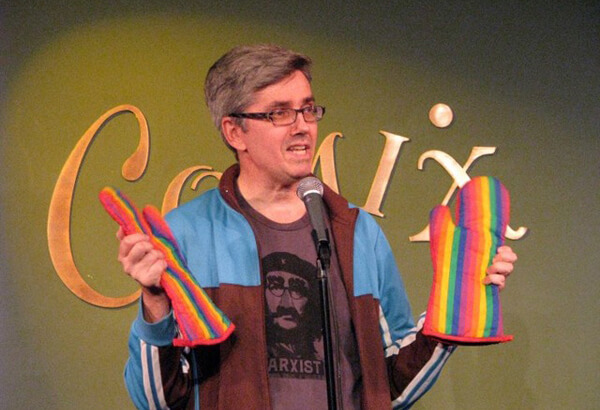BY DAVID NOH | At this time of year, I can’t think of anyone more appropriate to interview than Christmas Eve herself, aka actress Ann Harada, who put her indelible stamp on this role she originated in “Avenue Q.”
We sat down the day after her sold-out annual holiday Broadway Cares/ Equity Fights AIDS benefit blow-out, “Christmas Eve’s Holiday Hunkfest,” in which she surrounded herself with her usual bevy of singing and dancing Broadway actors. This year’s stud-filled stocking included Telly Leung, José Lana, Joel Perez, and John Bolton. Though understandably drained, Harada was still full of energy, detailing the career that she has admirably carved out, despite the challenges of being Japanese and never your usual Broadway ingénue type.
It was clear from our talk that things have improved since my acting days, when my Stella Adler Shakespearean teacher could only see Asians in villainous roles (I got Iago and Edmund) and professionals had to wait for the next “King and I” revival, or, worse, Ito in “Auntie Mame.”
Ann Harada, from Honolulu to Broadway; experience the Fabulous
“I’ve been very lucky,” Harada said. “It’s been great that people open their minds when casting me. With the exception of Christmas Eve, I have very rarely done any specifically Asian roles.”
Besides theater, Harada and I share roots, both being from Hawaii and attending Punahou School (where Barack Obama was two years ahead of her).
“I grew up in Kaneohe, which was still so small then, there was only one traffic light. My father was a CPA for Kamehameha schools and Bishop Estate, and my mother worked for the Bank of Hawaii and was friends with Obama’s grandmother. You couldn’t miss him in school, as he was one of only three black kids there, a stoner jock. We didn’t run in the same circle.
“My parents were always very supportive, took me to shows in Hawaii, and I guess my interest started in the drama club in high school. David Schaefer was the teacher, and then he left, and was replaced by Harry Williams, who was like a guy who acted in ‘Hawaii 5-0’ and stuff like that. I loved Hawaii but realized it wasn’t my place and I wasn’t gonna find anything to do there. I love big cities so I knew I’d end up in New York, right after college,” at Brown.
Not knowing exactly what she wanted to do in the theater, Harada took a job as an intern in a Broadway producers’ office, while living in “somebody’s garage in Brooklyn.” She was thrilled to hang out on Broadway, meet people, and watch auditions, until, as cowed as she was by the thought of not being good enough to really act herself, she realized that “I was certainly as good as a lot of those I was watching.”
Her first job was in a Maury Yeston/ Larry Gelbart musical, “1,2,3,4,5,” after which she paid her dues, appearing in the big, tortured flop that was “Seussical,” before booking “Avenue Q.” Composers/ writers Bobby Lopez and Jeff Marx had been working on it in a BMI workshop and were looking for an Asian actress. Harada’s friend, Amanda Green, gave them her number, she passed the audition, “and that’s how it started. I just took it over and we had no idea that this weird little show which featured the puppeteers onstage with the puppets would ever make it to Broadway.”
Harada loved her character from her first read, “and they were so good about listening to me when I said, ‘Look, you guys, you don’t have to change the ‘l’s’ and the ‘r’s’ for my accent, just write the fucking words! It’s too hard to figure out what the hell you mean — I’ll put the accent on it, and try not to make every joke about that. It’s funny every once in a while, but those aren’t real jokes. You have to write character-based jokes all the time! They wanted to have me say, ‘You rook a riddle row.’ But they were fine about it, and I also said to Jason Moore, ‘Whenever I come in, is there any way to not make the music so chinky-dinky-doo?’ I was like, ‘Stop! It’s not necessary!’
“What I loved about Christmas Eve was that she was so straightforward, the most educated person on that street. So, she has an accent — a lot of people do, that doesn’t mean they’re not smart. I didn’t want this character to be just about the switching of the ‘l’s’ and ‘r’s’. I wanted her to have a point; why is she there? I’m an unofficial dramaturg on most of my shows, always that girl who’s like, ‘You know, this scene doesn’t really tally up with this.’ It’s annoying to a lot of writers who don’t’ want actors talking, but if you hire me, you have to know that’s who I am.”
The stepsister Charlotte in “Cinderella” was another role that was basically tailored for Harada by writer Douglas Carter Beane. “He did this for the entire cast pretty much, so everybody who plays it subsequently basically has to be us. We all had so much input, and he was very cool if I said, ‘I need an extra syllable on this line to make it go patuppatuppatup and land.’ Jokes are rhythm, and it was great to work with comedians like Harriet Harris and Peter Bartlett, who’ve been around a million years and know what they’re doing.
“I adore Harris, the smartest comedian I’ve ever known, who really has the grand style which few know how to do. We’re devoted to each other, but she said, ‘A lot of people think I look Chinese.’ ‘No, Harriet, you don’t look Chinese at all.’ ‘Really? You don’t think there’s something about my eyes?’ ‘No, Harriet, not at all.’ ‘I don’t understand, so many people have said so.’ ‘Harriet, you’re living in a dream. They don’t get whiter than you, honestly.’”
Just being in an opulent, William Ivey Long-designed, newly written Rodgers & Hammerstein musical “when they’re both dead,” in a role that was better than the original was amazing for Harada.
“My father saw it before he died, and I remember how he made me sit down with a TV tray and watch Lesley Ann Warren in it, saying, ‘This is gonna be special.’ He loved her, and when I met her I didn’t know what to do, I was so beside myself, and yes, she has this incredibly long neck.”
Although Harada loves long runs because she can further mine her characters, the stunt casting on “Cinderella” proved a definite challenge: “The stepmother was played by Sherri Shepherd, Fran Drescher, and NeNe Leakes. They were who they are, with Sherri being probably the most okay of all of them. None of them had any theater training and had a very hard time accepting the fact that when they weren’t talking, they still had to look interested in the scene, as if the cameras were still on them.”
It got so bad in one case that Harada threatened to walk: “I literally had to give notes to the director to tell them to stand still when I’m talking, otherwise the punchlines won’t land. They were stars, so none of them felt like they needed to take any remedial acting classes. And nobody could get to the theater on time. That pisses me off because then the understudy has to be readied and the costumers go ballistic trying to figure out where the spare clothes are. This is not cool.”
Although she has done her share of TV and film work, including a small part in “Sisters,” Harada confesses to a certain lingering unease before the camera, with the stage really being her comfort zone. She loved being in “Smash” however, even in the decidedly dialogue-challenged role of Linda, the stage manager. Her dearth of lines was so apparent that songwriters Marc Shaiman and Scott Wittman even wrote a satirical song for her, based on her one ubiquitous utterance, “Ten minutes, people!”
“Angelica Huston was everything you want her to be — smart, witty, always on it, down to earth, prepared, not a diva. My God, when Uma Thurman was there, she was a pain in the ass, such a diva in terms of not being ready, all about wardrobe approval, blah blah blah. The boys were completely over her, ‘We’re ready! Why isn’t she ready?’”
In her personal life, Harada has come a long way from that Brooklyn garage. Married to cable TV consultant Peter Litman, she has a boy named Elvis and an enviable domestic situation on the Upper West Side, in a big three-bedroom apartment — a combo of two original ones — which her savvy parents “bought low” years ago. Her husband and mother, who lives with her, share child-rearing duties with her: “It was a big decision to have a child and I told Peter that when this baby happens, I am not going to be the fallback caretaker. This is gonna be totally shared because my career is just as important as yours and, frankly, I’ve been working on mine longer. That’s the deal because I am not gonna be the Mom who takes them on a field trip or makes the cupcakes. It sounds so silly now, but all my girlfriends were dropping out of the business once they had a baby. They didn’t care, but I did. I didn’t want motherhood to be the reason I didn’t have a career. It had to be my choice.”
Many feel Harada was robbed of a Tony nomination for “Avenue Q” (not to mention “Cinderella”): “I should have been nominated and a lot of people thought so then, so when I wasn’t I felt that I let the team down and was heartbroken about it. I feel like I’m never the kind of girl who’s gonna be acknowledged for awards. That’s not how I represent. That’s okay — some people are more out there than me and that’s the way it’s always gonna be.”
I told Harada that she is so damn beloved in the theater community that she may well be surprised, and asked her what her dream role would be. “Dolly, Rose and Mrs. Lovett. Basically, anything you think Angela Lansbury would be appropriate for.”
For lovers of fusion glam rock and uber-positive transgender politics, may I present the Fabulous. This fearless glitter-bedecked duo, comprised of super-talented musician/ songwriter Nathan Windsor and the flamboyant Jacob Mondry have already amassed quite a cult following after their triumphant Sunday night appearances at Pianos on the Lower East Side, and continue to perform all around New York.
I met up with them at my favorite interview haunt, the Hudson Diner, which we did in character — consider me Hedda Hoopskirt for the new millennium. It was a raucously fun meet, but its deliciously rambling nature, not to mention heavy infusions of, yes, fabulous fancy, did not exactly lend itself to coherent journalism, so I will let Windsor do the talking here:
“Amerigogo was the disco-punk band that I started in 2012. The band basically parted ways to pursue other dreams that were not music. Jacob and I stayed on because we had worked with each other for so long, since 2010. When Jacob joined, I was playing with songs like ‘Straights Go Gay’ and ‘Whiplash’ which explores themes of sexuality. Jacob had expressed interest in doing comedy work and also doing drag, and we came up with the name Essi X for her. Then we started asking questions: who was she? Where was she from? What if she was from space? What was she doing here? What was she running from? What is being fabulous/ normal/shade?
“We started writing episodic ideas and based songs around main themes, like we were creating a musical alien transsexual version of ‘I love Lucy.’ We feel it’s important to support equality and self-expression, and our financial support of LGBTQ organizations puts our money where our mouth is. That’s why we’re working with Campus Pride and why we’re launching the ‘Freemale Challenge,’ which is the ice-bucket challenge for putting on makeup.
“Our next move is to do our shows as exclusive happenings. We will announce the show to our fans exclusively and start surprising audiences, guerilla-style.”
Do check them out. In a benefit for Campus Pride (only $10), the Fabulous appear at Bizarre Bushwick, 12 Jefferson St., between Bushwick and Myrtle Avenues, at 9:15 p.m. on New Year’s Eve. Their song “Whiplash” really rocks, and you can learn more about them at thefab.party or by calling 413-729-3222.



















